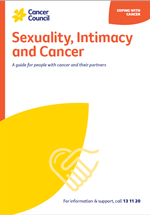- Home
- About Cancer
- LGBTQI+ People and Cancer
- Sexual intimacy and cancer
- Adapting to changes in your sex life
Adapting to changes in your sex life
Changes to how you enjoy sexual intimacy and activity can be challenging and upsetting. Give yourself time to adjust. There are several ways to adapt how you have sex during or after cancer treatment. You might find some of the following tips useful.
Talk about what has changedShare any concerns about having sex or being intimate with your partner/s. Tell them when you are ready to have sex, what still works for you, what doesn’t and if they should do anything differently. | |
Try other forms of intimacyShow affection by cuddling, holding hands, lying together naked, kissing and massaging. Talk about what has changed to avoid misunderstandings and take the pressure off going further. | |
Explore different ways to have sexIf the way you used to have sex has changed, try different sexual positions; explore different erogenous zones; manual sex, including fingering and fisting; mutual masturbation; oral sex; genital rubbing; personal lubricants (lube); vibrators and other sex toys; erotic images and stories; sexual fantasies and kink. | |
Plan aheadUsing lubricants (lube) and erection devices, taking medicines, and managing incontinence or stomas may all mean you have to plan when to have sex. Some people say they miss spontaneity, others find that scheduling sexual activity gives them something to look forward to. | |
Focus on other aspects of your relationshipMany people in relationships do not see sex as important. How you feel about sex may also change as you get older. Spend time together doing things you both enjoy that also bring you closer. That way, sex isn’t the only way that you show your affection and share intimacy. | |
Use relaxation and meditation techniquesFeeling relaxed can help with sexual pleasure. Use free apps and podcast guide you through learning relaxation and meditation techniques. Many treatment centres run meditation programs.Listen to our meditation and relaxation podcast. | |
Explore what has changed on your ownTouch and masturbation can help you to understand any changes in how you feel in a way that you have complete control over. You can figure out what feels good to you, or what feels sore or numb, without feeling self-conscious or pressure to “perform” or to keep going if you don’t want to. Once you feel comfortable exploring your body, you can show your partner/s what feels good and works best. | |
Seek assistanceAsk your health care team how to manage any sexual changes. Your doctor can also refer you to a sexual health physician, sex therapist or psychosexual counsellor. |
For more on this, see our general section on Sexuality, intimacy and cancer.
→ READ MORE: Communicating with your partner/s
Podcast: Sex and Cancer
Listen to more of our podcast for people affected by cancer
We thank the chief investigators from the Out with Cancer research project: Prof Jane Ussher, Prof Janette Perz, Prof Martha Hickey, Prof Suzanne Chambers, Prof Gary Dowsett, Prof Ian Davis, Prof Katherine Boydell, Prof Kerry Robinson and Dr Chloe Parton. Partner investigators were Dr Fiona McDonald and A/Prof Antoinette Anazodo. Research Associates were Dr Rosalie Power, Dr Kimberley Allison and Dr Alexandra J. Hawkey.
We thank the reviewers of our LGBTQI+ People and Cancer booklet: Prof Jane Ussher, Chair, Women’s Heath Psychology and Chief Investigator, Out with Cancer study, Western Sydney University, NSW; ACON; Dr Kimberley Allison, Out with Cancer study, Western Sydney University, NSW; Dr Katherine Allsopp, Supportive and Palliative Care Specialist, Westmead Hospital, NSW; A/Prof Antoinette Anazodo OAM, Paediatric and Adolescent Oncologist, Sydney Children’s Hospital, NSW; Megan Bathgate, Consumer; Gregory Bock, Clinical Nurse Consultant–Oncology Coordinator, Urology Cancer Nurse Coordination Service, WA Cancer & Palliative Care Network, WA; Morgan Carpenter, Executive Director, Intersex Human Rights Australia (formerly OII Australia); Prof Lorraine Chantrill, Medical Co-Director Cancer Services, Illawarra Shoalhaven Local Health District, NSW; A/Prof Ada Cheung, Endocrinologist, Head, Trans Health Research Group, Department of Medicine (Austin Health), The University of Melbourne, VIC; Bonney Corbin, Australian Women’s Health Network; Cristyn Davies, Research Fellow, Specialty of Child and Adolescent Health, Faculty of Medicine and Health, The University of Sydney and Children’s Hospital Westmead Clinical School, NSW; Prof Ian Davis, Professor of Medicine, Monash University and Eastern Health, Medical Oncologist, Eastern Health, Chair, ANZUP Cancer Trials Group, VIC; Rebecca Dominguez, President, Bisexual Alliance Victoria; Liz Duck-Chong, Projects Coordinator, TransHub and Trans Health Equity, ACON, NSW; Lauren Giordano, 13 11 20 Consultant, Cancer Council NSW; Hall & Wilcox (law firm); Natalie Halse, BCNA Consumer Representative; Jem Hensley, Consumer; Prof Martha Hickey, Professor of Obstetrics and Gynaecology, The University of Melbourne, and Director of the Gynaecology Research Centre, The Women’s Hospital, VIC; Kim Hobbs, Clinical Specialist Social Worker – Gynaecological Cancer, Westmead Hospital, NSW; Dr Laura Kirsten, Principal Clinical Psychologist, Nepean Cancer Care Centre, NSW; Amber Loomis, Policy and Research Coordinator, LGBTIQ+ Health Australia; Julie McCrossin and Melissa Gibson, Consumers; Dr Fiona McDonald, Research Manager, Canteen, NSW; Dr Gary Morrison, Shine a Light (LGBTQIA+ Cancer Support Group); Penelope Murphy, Cancer Council NSW Liaison, Prince of Wales Hospital, NSW; Dr Rosalie Power, Out with Cancer study, Western Sydney University, NSW; Jan Priaulx, 13 11 20 Consultant, Cancer Council NSW; Paul Scott-Williams, Consumer; Simone Sheridan, Sexual Health Nurse Consultant, Sexual Health Services, Austin Health, VIC; Cheryl Waller and Rhonda Beach, Consumers.
View the Cancer Council NSW editorial policy.
View all publications or call 13 11 20 for free printed copies.
Need to talk?
Support services
Coping with cancer?
Speak to a health professional or to someone who has been there, or find a support group or forum
Need legal and financial assistance?
Pro bono services, financial and legal assistance, and no interest loans
Cancer information
Dealing with the diagnosis
Common reactions to a cancer diagnosis and how to find hope
Explore our resource hub
Explore and download our booklets, fact sheets, podcasts, webinars and videos for people affected by cancer
